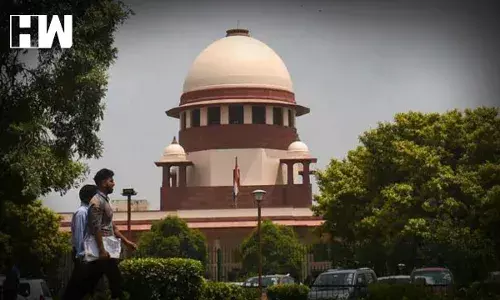New Delhi: The Centre has expressed reservations at the Supreme Court about the panel’s conclusions that sex workers should not be detained, penalized, harassed, or victimized because voluntary sex work is “not criminal” and only maintaining a brothel is illegal.
A Supreme Court-appointed panel has recommended various guidelines including one that “Whenever there is a raid on any brothel since voluntary sex work is not illegal and only running the brothel is unlawful, the sex workers concerned should not be arrested or penalised or harassed or victimised.”
“Needless to say, this basic protection of human decency and dignity extends to sex workers and their children, who, bearing the brunt of social stigma attached to their work, are removed to the fringes of the society, deprived of their right to live with dignity and opportunities to provide the same to their children, ” the Supreme Court said while dealing with Centre reservation on certain recommendations of the panel.
The top court further observed, “It need not be gainsaid that notwithstanding the profession, every individual in this the country has a right to a dignified life under Article 21 of the Constitution of India.”
However, Additional Solicitor General Jayant Sud stated that the Government of India had doubts about the panel’s findings, stating that voluntary sex work is not illegal and that only running a brothel is prohibited, with no action taken against sex workers.
Union of India is directed by a bench of justices L Nageswara Rao, BR Gavai, and AS Bopanna.
The panel recommended that the government respond to the panel’s recommendations within six weeks, and the case was set for July 27, 2022.
On July 19, 2011, the Supreme Court appointed a panel consisting of Pradip Ghosh as Chairman, Jayant Bhushan as Senior Counsel, Usha Multipurpose Co-operative Society through its President/Secretary, Durbar Mahila Samanwaya Committee through its President/Secretary, and Roshni through Saima Hasan.
The Panel provided a complete report on the terms of reference after a thorough discussion with all interested parties.
The panel has proposed a number of rules, including that sex workers be afforded equal protection under the law, and that when it is evident that the sex worker is an adult who is participating with consent, the authorities should refrain from interfering or pursuing criminal action. Also, when a sex worker files a criminal/sexual/other type of offence report, the police must take it seriously and follow the law.
The panel recommends that the federal government and state governments include sex workers and/or their representatives in all decision-making processes, including planning, designing, and implementing any policy or program for sex workers, as well as formulating any changes or reforms to sex work laws. The Centre, on the other hand, has expressed doubts about these recommendations.
However, the Centre has agreed to some of the panel’s recommendations, such as providing all facilities available to a survivor of sexual assault, including immediate medical assistance, to any sex worker who is a victim of sexual assault, and directing state governments to conduct a survey of all ITPA Protective Homes so that cases of adult women,who are detained against their will can be reviewed and processed for release in a time-bound manner.
The court has ordered state governments and union territories to operate in strict accordance with the panel’s recommendations, which the Centre has agreed to.
It further ordered the competent authorities to follow the provisions of the Immoral Traffic (Prevention) Act, 1956.
“It need not be gainsaid that notwithstanding the profession, every individual in this country has a right to a dignified life under Article 21 of the Constitution of India. The Constitutional protection that is given to all individuals in this country shall be kept in mind by the authorities who have a duty under the Immoral Traffic (Prevention) Act,1956. The other recommendations that are made by the panel shall be taken up after summer vacation,” the court said.
Meanwhile, the UIDAI has looked over the proposals and decided to go through with the suggested approach for issuing ID cards.
The court further ordered that sex workers be provided Aadhar Cards based on a proforma certificate issued by UIDAI and submitted with the Aadhar enrolment form/application by the Gazetted Officer at NACO or the Project Director of the State Aids Control Society.
It said that there shall be no breach of confidentiality in the process, including the assignment of any code in the Aadhar enrolment numbers that identify the cardholder as a sex worker.
As an independent media platform, we do not take advertisements from governments and corporate houses. It is you, our readers, who have supported us on our journey to do honest and unbiased journalism. Please contribute, so that we can continue to do the same in future.

